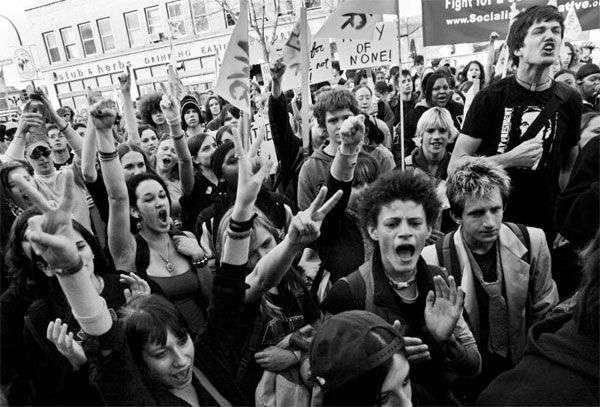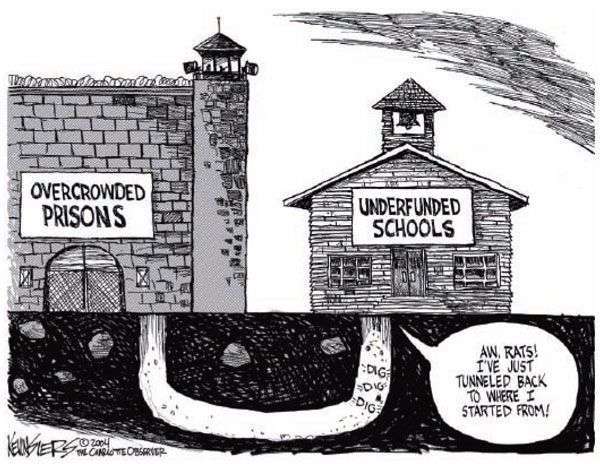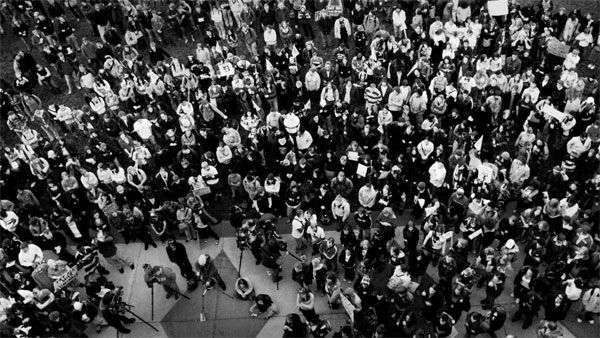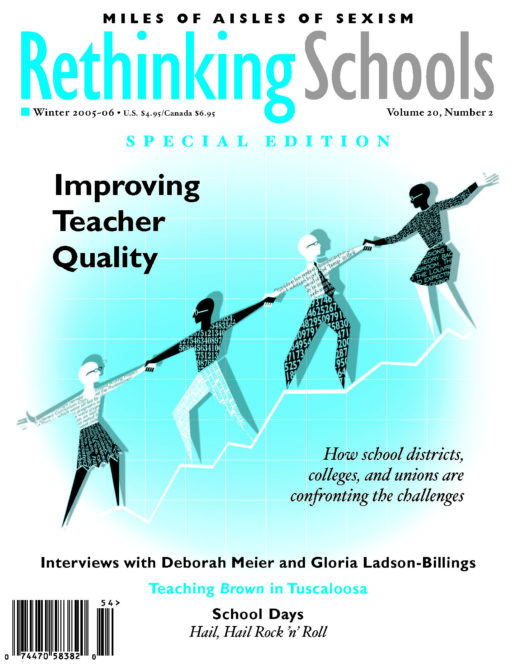Teacher Organizers Take Quality into Their Own Hands

All across the country, educators, parents, students, and community members are uniting to create social change — and improve teacher quality. The proliferation of these groups demonstrates the power of teachers working together to improve lives for students and teachers, both inside the classroom and out.
Though not a comprehensive survey, the article below describes some of the many ways these groups are making things happen, through workshops, curriculum fairs, teach-ins, discussion groups, and protests.
In New York, the New York Collective of Radical Educators (NYCoRE) is an organization of public school teachers working to create social change through curriculum development, mobilizing teachers inside and outside of the classroom, and working with community and parent organizations. Their mission statement says “The struggle for justice does not end when the school bell rings.” NYCoRE hosts a series of “working groups” to initiate action around educational justice issues. These working groups focus largely on changing policies that target and criminalize youth, especially youth in low-income neighborhoods and youth of color.
NYCoRE working groups meet periodically, depending on the nature of each group’s particular mission and plan for action. Counter Recruiting and Militarization in Schools helps plan NYCoRE’s ongoing counter-recruitment efforts. Justice Before Just-Tests works against high-stakes testing. Campaign Against the Criminalization of Youth organizes students and teachers to end policies that promote a police state in public schools.
NYCoRE’s “inquiry to action groups” meet on a regular basis from early fall through March. These are less action-oriented than working groups, but offer educators the opportunity to reflect on their own classroom practices.
On the other side of the country, in the San Francisco Bay area, Teachers 4 Social Justice (T4SJ) is a grassroots, nonprofit teacher support and development organization. Its mission is to provide educators with opportunities for self-transformation, leadership, and community building to effect meaningful change in the classroom, school, community and society as a whole.
T4SJ offers a number of workshops and study groups consistent with its mission statement. The study groups meet once every three weeks from October through April for a three-hour session. Curricu-lum for the study groups is built around the investigation of specific topics through research and personal experience. Classroom teachers facilitate the study groups with the understanding that the group is made up of equals working for change. Discussions are usually brainstorming sessions stemming from personal experiences of the group members, and solutions to classroom- and school-wide problems are arrived at through investigation and reflection on issues through a social justice lens.
The workgroups for this year include Justice and Access through Math and Science, Teaching Social Justice for New and Future Teachers, Strong Parent Teacher Partnerships (including five parents and five teachers coming together to engage in problem-solving through the parent-teacher relationship), Intersections of Racism and Discipline, and the High-Stakes Testing Working Group that has been meeting for more than two years.
T4SJ works to use schools as an extension of the community, reflecting the interests of diverse people. Their goals include maintaining a network of progressive educators, sustaining a capable and engaged membership group, and working toward an education system that is responsive to the needs of the communities it serves and promotes equitable access to resources and power.
In Chicago, Teachers for Social Justice (TSJ) organizes to bring about change through hosting a curriculum fair, developing curriculum, and working on organizing campaigns in coalition with other community groups. Made up of teachers, administrators, preservice teachers, and other educators working in all kinds of schools in the Chicago area, TSJ organizes and acts on the principle that schools should empower students to act as socially conscious citizens guided by ideas of equity and social justice.
TSJ has tackled issues like school militarization, privatization of schools, and the gentrification of Chicago’s poor communities. TSJ cites the need for its work in the Chicago school system, which has been increasingly warped by high-stakes testing and top-down mandates.
In particular, TSJ members have been active in countering Chicago’s Renaissance 2010 plan, which organizers say contributes to gentrification and privatization of the schools. Members have done research to document the city’s lack of investment in the public schools and have mobilized teachers and community members to speak out at school board meetings, rallies, and other public events.
TSJ also hosts an annual social justice curricula fair each fall. Teachers lead workshops and present curriculum they have developed and used in their classroom. Students often attend the fair with their teachers so they can present their work and discuss education with their teachers. This year’s curriculum fair featured a discussion titled “Beyond School Militarization and Privatiza-tion: Is This the Best We Can Do for Our Youth?”

Inspired by the Chicago TSJ curriculum fair, another group, the Literacy for Social Justice Action Research Group (LSJTRG) in St. Louis, organized its first curriculum fair in the fall of 2005. The fair, called “Educating for Change,” was a milestone for the group and included table demonstrations, workshops, and interactive presentations that connected education and social justice.
LSJTRG began in 2001 with hopes of building a supportive community for educators struggling to create a more just society. The group initially functioned as a place to share the best techniques for contributing to justice, inquire into classroom practices with other teachers, and envision more just classrooms, schools, and communities.
Today, LSJTRG boasts a diverse membership in terms of race, age, years of teaching experience, and teaching context. The group reads common texts, discusses these in relation to teaching practices, conducts action research, organizes for community activism, and participates in consciousness-raising workshops (for example, around labor rights and dismantling racism). All members receive free study group books and have access to various classroom resources for their own classrooms.
Members are also invited to attend an annual summer institute at the end of each year, which extends the research and builds upon the group’s work of the previous year. In addition to hosting its first curriculum fair, LSJTRG has participated for several years in the International Reading Association’s African American Read-In Day, as a form of support for other community organizations.
In Oakland, Calif., the Education Not Incarceration (ENI) coalition is a grassroots coalition of teachers, students, parents, and concerned community members working to reprioritize the way our government invests in the future, re-directing resources away from prisons and toward education.
Sparked by budget cuts in the California education system in favor of increased prison spending, ENI spreads the word about bloated prison budgets and inequitable education funding. Teacher involvement is crucial to all ENI work.
With statistics and lesson plans on its website, the organization offers teachers a range of options and techniques to incorporate lessons into their classrooms. ENI readers, developed by its members, include the organization’s curriculum, fact sheets, reports, press resources, and information for community members interested in starting ENI chapters.
Teachers and students have also participated in ENI visits to the state capital, workshops, and demonstrations. ENI’s Educators’ Group provides support for teachers working to make classrooms accessible to diverse youth and it supports youth organizing and leadership development. It also seeks to organize teachers to make broader changes in their unions and communities.
Farther up the West coast, Portland Area Rethinking Schools (PARS) began as a small study group in 1985. Today it is a regional network of teachers, teacher educators, student teachers, and others concerned about creating just schools and society. Throughout its history, PARS has worked around a diverse array of issues, including tracking, standardized testing, No Child Left Behind (NCLB), budget cuts, school food, and the war in Iraq. Acting upon its many concerns and discussions, PARS has sponsored teacher workgroups including global justice curriculum development, new teacher support, critical elementary teaching, and research on the effects of NCLB.
PARS sponsors TGIFs with a Point — educational gatherings that bring together educators of conscience to share resources, discuss burning issues, hear local and national speakers, and engage in exemplary curricula — as well as occasional teach-ins on current issues.
Farther north, Puget Sound Rethinking Schools is a group of educators and a few parents/ guardians in the Seattle area. The group discusses the impact of standardized testing in the abstract and at the state level in Washington, the importance of multicultural and anti-racist education, union issues, global and international education, and local education issues.
Teacher involvement plays a key role in the group’s activities. Teachers keep up with events, share resources, and dialogue through email, postings, and a Yahoo group. Small groups of members also hold monthly meetings and attend special events together. The group also hosts educational forums, such as the forum on the impact of the Washington Assessment of Student Learning (WASL), a NCLB response group, and more.
In Philadelphia, the Coalition of Radical Educators (PhillyCoRE) focuses on making schools sites of social change, from inside and outside the classroom. This organization shares knowledge about how to bring social justice into the classroom. Meetings focus on support and progressive action on topics such as progressive discipline, moving from community service to justice, critical teaching of testing skills, and much more.
Progressive Educators for Action (PEAC) in Los Angeles is the driving force behind the recent progressive movement in the union leadership of United Teachers Los Angeles. PEAC participates in demonstrations on budget issues and overcrowding. The organization branched off to offer an outlet for teachers in Los Angeles who want to see changes in their school system.
Progressives Engaged in Struggle Support Network (PrESS Network) out of Louisville, Ky., works to end the isolation of progressive teachers. The group meets regularly to provide support to members regarding progressive work done in classrooms, presents work at academic conferences, and serves in the local community. It is also hosting a teach-in about Hurricane Katrina and connecting national issues to its Louisville community.
Media Connections
The media organizations mentioned below are part of an ever-expanding movement that offers vital resources and support for social justice education work around the country.
Teaching for Change is an essential distributor of curriculum resources for teachers, parents, and education activists. It sees its mission as providing tools to transform schools into socially equitable centers of learning. The online catalog, www.teachingforchange.org, is easily accessible. Its book Putting the Movement Back into Civil Rights Teaching has been adopted as the core curriculum for the Smithsonian Institution Traveling Exhibition Service for the 381 Days: The Montgomery Bus Boycott Story, which will be traveling nationally for three years.
Teaching Tolerance provides free educational materials that promote respect for differences and appreciation of diversity in the classroom and beyond. Teaching Tolerance publishes a free quarterly magazine and offers curriculum kits that have been widely acclaimed. The organization also provides web resources, materials for student-led activism, classroom activities, examples of grants for anti-bias educational projects, and a monthly e-newsletter.
Chicago Media Watch is an organization that recognizes the effect of the media on large-scale communication and aims to use it as a tool for change. Chicago Media Watch wants to ensure that the media remain open, honest, and responsive to the people’s needs. The organization is developing curriculum for media literacy and holds conferences and seminars on media and alternative media.
Based in Boston, The New England Literacy Resource Center publishes The Change Agent to support educators bringing social justice issues into the classroom. This publication uses media to mobilize teachers to advocate for educational issues.
And of course, Rethinking Schools, based in Milwaukee, publishes a national quarterly magazine, books, and classroom resources. We maintain a website www.rethinkingschools.org, where teachers can access lessons and articles from our back issues. Rethinking Schools participates in and hosts events on a regular basis, and links activist educators around the country to current events while providing curricula, resources, and a classroom perspective on national policy debates.
Going National

A crowd estimated by police at more than 1,000 students gathered at the University of Minnesota’s Coffman Union Plaza in protest of the war in Iraq.
The National Association for Bilingual Education (NABE) is a professional organization at the national level devoted to representing English language learners and bilingual education professionals. NABE has affiliate organizations in 23 states and has a combined membership of more than 20,000 teachers, administrators, paraprofessionals, university professors and students, researchers, advocates, policymakers, and parents. NABE provides development opportunities for its members, forms partnerships with other civil rights organizations, lobbies at the federal and state levels, and hosts annual conferences to promote its campaigns to educate the public about the effectiveness of bilingual education.
The National Council of Teachers of English (NCTE) has worked to develop quality teaching and research and to improve student achievement in English language arts at all academic levels. NCTE supports language arts education nationwide and helps connect educators interested in improving the quality of language arts teaching.
The National Writing Project (NWP) builds leadership, programs, and research needed for teachers to become successful writers and learners. The organization’s goal is to produce teachers capable of instructing every student to write well. The NWP conducts an annual summer institute where teachers from around the country come to share effective practices for teaching students to write. These teachers then return to their local communities and put their new knowledge and leadership skills to work in their classrooms, schools, cities, and states. The NWP continues to add sites each year to its program, which already serves more than 100,000 teachers annually.
Many teachers nationwide are working tirelessly to improve the quality of education in America. As these teachers unite, form networks, and share skills, they are helping to build a real movement for reform of our schools. Teacher-led groups provide support, create materials, and ultimately act on solutions to the most pressing problems in education. This survey gives us a glimpse into the world of teachers working to improve quality in their classrooms, their communities, and on the national level.

